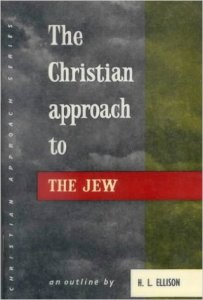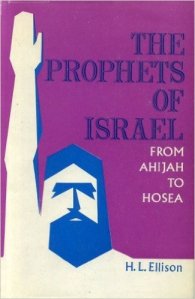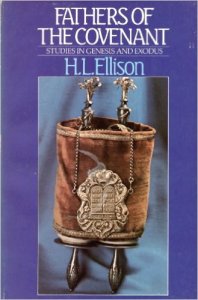Rev Leopold Zeckhausen was a stalwart of CMJ, the IHCA (today IMJA) and IMCCAJ (International Missionary Council’s Committee on the Christian Approach to the Jews). A participant in major conferences, a writer, speaker and minister, he married CMJ worker Sara Jane Ellison. His son H. L. (Henry Leopold) Ellison was a distinguished Old Testament scholar who I knew in the 1980s. Zeckhausen served in Holland, USA, 
Israel and the United Kingdom. Here is his account in Bernstein: Some Jewish Witnesses:
Zeckhausen, Rev. Leopold. The following is from his own pen:-
“I was born in December, 1862, at Kovno in Russia, of strictly orthodox Jewish parents, and, with the rest of my brothers, I got the usual education of rabbinical Jews. My mother, like so many mothers in Israel, would fain have seen me devoting myself entirely to the Talmud. I was to be the rabbi of the family. My inclinations, however, were in the [529] direction of secular knowledge, and my father was broad-minded enough not to insist upon an exclusively rabbinical training. At the age of eleven I was accordingly sent to the local Gymnasium, or grammar school. After a stay of six years at this school I left Russia with the intention of studying medicine at the University of Koenigsberg in Prussia. But six months later financial difficulties, in which my father found himself, necessitated my dropping the studies and accepting a post offered me in an office (July, 1881.)
“Once in business I threw myself heart and soul into my new vocation, and kept on rising steadily. At the end of ten years spent in business houses in Koenigsberg, Frankfort and Amsterdam, I was offered a partnership at Libau in Russia. I declined it, however, after some deliberation, and decided to leave business for good (1891).
“That step was the outcome of another and a more important one, which I had taken three years previously, and which proved to be the turning point of my life. While still at my father’s house I had begun to get weary of the endless, and often meaningless ceremonies of rabbinical Judaism. In Germany and Holland, surrounded by general religious indifference and rampant scepticism, my faith in Judaism waned more and more. I tried to make myself acquainted with Christianity, assayed to study the New Testament, but not with the hope of finding in it truth and peace. My studies were mostly of a critical nature. My Jewish prejudices, though largely toned [530] down by frequent intercourse with Christians, were still potent enough to prevent an impartial investigation. The difficulties of the Gospels seemed to me insuperable.
So I continued to drift further and further away from religious influences, until at Amsterdam I found myself at a boarding house in the company of some earnest Christian young men. They were schoolmasters—intelligent, idealistic, eager to learn and to exchange thoughts with others, and before very long we were on friendly terms. Through their intercourse, the almost extinguished interest for religious thought once more revived in me. Not that we ever went in for regular theological discussions—mere politeness forbade that—but Dante’s ‘Inferno,’ Milton’s ‘Paradise Lost,’ and other literary productions with a religious basis, were often talked over among us, and I could not help being impressed by the true, though unobtrusive, religious fervour of those educated young men.
“I decided to look for a person competent to deal with my prejudices and willing to assist me to a spiritual understanding of Christianity. An Encyclopædia helped to the address of the London Society for Promoting Christianity amongst the Jews, and a letter from the Secretary introduced me to the Society’s missionary at Amsterdam, the Rev. A. C. Adler. I told that gentleman, on my first visit to him, that it was not so much the history of Christ and Christianity as the spiritual element of the New Testament that baffled me, and that I should feel obliged to him for some light upon the subject.
I did not pretend to any [531] desire of embracing Christianity, nor did Mr. Adler, on his part, so much as hint at that eventuality. He most readily acceded to my request for enlightenment, and suggested that we should read together the Gospel of St. John. For some seven weeks I had the little expected pleasure of listening to a masterly exposition of a book that had been till then the least intelligible one to me in the New Testament. I shall never forget the impression Mr. Adler’s intelligent interpretation of that Gospel produced upon my mind and heart. I felt myself literally introduced into a new world—into that spiritual world of which the carnal mind and the materialist know nothing. The person of Christ kept on growing before and within me until I could think of nothing else. But I was not to yield myself to Him without a struggle.
“Mr. Adler, with an unerring tact, restricted himself conscientiously to the task of instruction. He asked no questions, nor did he invite me to a confession of faith. Had he done so, I fear he had but succeeded in repelling me, at least for a time.
“When I found myself face to face with the question:—’What think you nowof Christ?’—pride of reason and lingering prejudice seemed to assert themselves more. I at once suddenly ceased visiting Mr. Adler and thought of getting Christianity out of my head entirely. I cannot tell whether Mr. Adler still entertained the hope of ever seeing me again in his study; I certainly intended that it should not be the case. [532]
“The Lord Jesus, however, had become too strong for me to resist Him successfully for any length of time. My peace of mind was clean gone, and I had, for my own part, experienced the truth of our Lord’s words, ‘No man can come to Me, except the Father which hath sent Me, draw him.’
“After a time I was again at Mr. Adler’s. When, in answer to my knock there came his Dutch ‘Binnen!’ (‘Come in!’), and I stepped into the room, Mr. Adler came hurriedly up to meet me, and, taking both my hands, exclaimed joyfully, ‘You have come again. Then all is right. I knew you would not come unless your doubts were conquered. I have been praying for that.’
“A few days after this episode I received a telegraphic message necessitating my immediate return to Germany. I took at once a train to Zandvoort, a seaside place near Amsterdam, where Mr. Adler was at the time with his family for their summer holiday. I told him I had to leave Holland without delay and requested, as a special favour, that he would admit me into the Church of Christ by baptism the very next day. Mr. Adler looked rather perplexed. He was, on principle, he told me, opposed to doing things in a hurry, and especially when baptism was under consideration. But my case was so exceptional that he thought he saw in it the Lord’s doing, and could not therefore refuse my request.
“The following morning, Sunday, August 12th, 1888, Mr. Adler was in the pulpit of his church, [533] after explaining the reason of his unexpected return to Amsterdam, he invited the congregation to be present at my baptism that afternoon. Saintly old Mr. Bloch, late missionary of the L.J.S., and the beadle of the church, acted as witnesses to my public declaration of faith in Christ crucified.
“On the day following my baptism I had already left Holland, and was on my way back to Koenigsberg. There I spent another three years, following my commercial vocation and keeping up all along a pretty regular correspondence with Mr. Adler, to whose instruction I owed so much. In those letters he frequently reminded me of my Christian duty toward my Jewish brethren, and invited me to offer myself for missionary training. I doubted my qualifications for such a calling, questioned the advisability of going back to college after an interval of ten years spent in commercial pursuits, but at last I decided to follow the call, and sent an application to London for admission into the London Jews’ Society’s Missionary College. I was admitted there in December, 1891, and remained associated with the Institution for three years and a-half, till July, 1895.
“Having completed the course of my studies, I was attached to the staff of the London Mission, thence I was transferred to work at Manchester in 1896, and exactly three years later to Jerusalem. Here I was ordained deacon at Christmas, 1900, and priest on Trinity Sunday, 1902, by the Bishop of the Church of England in Jerusalem and the East, Dr. Blyth. Here also I was married to Miss Sara Jane Ellison, [534] daughter of the late Dean Ellison, of Shillelagh, County Wicklow, Ireland, April, 1901.
“I may be allowed to mention in conclusion that the decision to give up my business prospects, in order to become a missionary to the Jews, was soon amply rewarded by the Lord. My elder brother, with whom I had exchanged many letters on the subject of Christianity ever since I had embraced it myself, without apparently making much impression on him, wrote to me now—having heard of the step I had taken—to express his appreciation of what I had done. ‘Whatsoever people may think of your motives or your actions, there is probably no one that can put them down at their proper value better than myself,’ ran his note. ‘I have seen you during the last ten years steadily climbing the ladder of commercial success, gaining in experience and reputation, and about to earn the fruit of much labour, and then to throw it all deliberately over in order to become a missionary! I cannot help admiring you. You have done the right and proper thing. Though we differ in our religious opinions, we do not on the point of principle. You have acted as I should have expected an honest man, with soul above £ s. d. to act. It is refreshing to find enthusiasm for ideal goods in our sordid age of materialism.’
“This brother of mine is now, I am grateful to say, himself a worker in the Lord’s vineyard, labouring with marked success as a medical missionary amongst the Jews of New York, faithfully assisted by his wife—also a convert from Judaism.”[535]
In 1902 the Rev. L. and Mrs. Zeckhausen were transferred from Jerusalem to Cracow; and in 1908, on the death of his spiritual father, the Rev. A. C. Adler, he succeeded to the headship of the L.J.S. mission at Amsterdam and Rotterdam.
Prayer: Thank you, Lord, for the life, ministry and legacy of your servant Leopold Zeckhausen. May his memory be for a blessing and an encouragement for all. In Yeshua’s name we pray. Amen.
http://www.gutenberg.org/files/37734/37734-h/37734-h.htm









Reblogged this on Talmidimblogging.
LikeLike
Thank you for the Zeckhausen account! I greatly value the Bible books of H.L. Ellison; one paragraph of Ellison has more substance and insight into the Old Testament than many a page of other learned writers! I found with some difficulty a life sketch of Ellison written by his Plymouth Brethren admirer, F.F. Bruce, but neither Ellison nor others appear very forthcoming about his personal life or biography. This commendable reticence makes the Zeckhausen account doubly worthwhile.
Monty Ledford Aberdeen Idaho USA
LikeLike
Pingback: July 10 1903/1983 Birth and Death of H L Ellison, Hebrew Christian Scholar and Gentleman #otdimjh | On This Day In Messianic Jewish History
A number of decades ago I heard Mr. H L Ellison speak. The article, above, has some interesting and informative details about his family background.
LikeLike